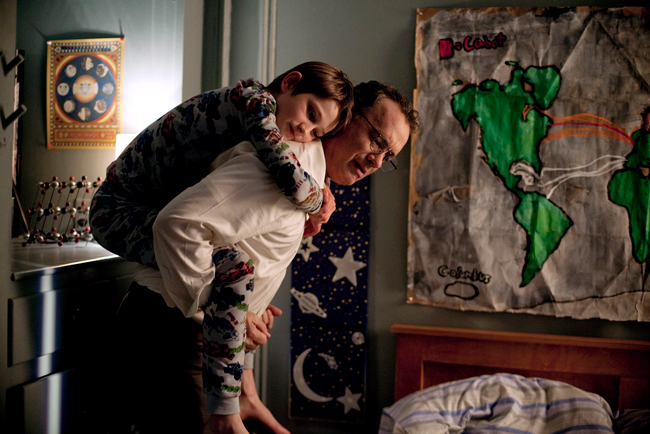Since the dawn of cinema, Hollywood has been quick to exploit tragedies new and old for cinematic value, not to mention the occasional awards season boost in prestige. It wouldn’t be too difficult to amass an impressive DVD collection solely from films based on the atrocities of the Holocaust and World War II, and the period is represented almost annually in the Best Picture race. Therefore, it’s only fitting that the greatest catastrophe our generation has ever faced, Sept. 11, be mined for similar cinematic gravitas. Unfortunately, “Extremely Loud and Incredibly Close,” based on the best-selling novel by Jonathan Safran Foer, is not the film to begin addressing that horrific day, with a shamelessly manipulative, nauseatingly twee helping of Oscar bait.
From its very first scene, “Extremely Loud” launches a full-scale attack on the audience’s heartstrings, staging a fairly offensive credits sequence featuring Tom Hanks falling from one of the Twin Towers. You see, Hanks’ Thomas Schell is the father of 9-year-old Oskar (Thomas Horn), a young boy teetering on the line separating precocious and autistic (although Oskar’s voice-over informs us he was never officially diagnosed). When Oskar finds a key in his father’s closet a year after his death, the grief-stricken boy is convinced that there’s something out there that his father meant for him to find and proceeds to travel all over New York City in search of the single lock that fits his key.
One of the last films to attempt to wring the final bits of pathos out of the Holocaust genre is “Extremely Loud” director Stephen Daldry’s last film, “The Reader,” which was bafflingly nominated for Best Picture in 2008. Unfortunately, Daldry has just gotten better at turning up the big emotions, and “Extremely Loud” is shamelessly calculated to shake every last tear out of its audience. From a pervasive voice-over that reveals every thought running through its lead’s head, to the way the film deals out its flashbacks so its most manipulative moment (a recording of a phone call made from inside a collapsing tower) is saved for last, the film feels tailor-made to devastate at every turn.
Despite this, the film manages to be something of a bore, flabby and overlong with too many self-indulgent flourishes and detours, some more effective than others. Many of the characters Oskar encounters in his journey are relatively compelling figures, especially the mute tenant played by Max von Sydow. Sydow gives a soulful performance without dropping a line of dialogue, and the excruciating pain in his face as he listens to a tape from inside the towers is more convincing than any other element in the film. Also strong are Viola Davis and Jeffrey Wright as a couple driven apart by the tragedy.
Hanks is as affable and charming as ever, but the plot requires that his role be a strictly supporting one. It’s a shame, since Hanks usually brings a sense of play and adventure to the film that’s lacking elsewhere. Meanwhile, Sandra Bullock does her best as Oskar’s grieving mother, but much of her material is the most cloying in the film, and too many of the plot’s biggest contrivances are hung on Bullock being equally naïve and streetwise, which makes for a bit too much to swallow. Meanwhile, Horn is fairly terrible, unable to give the film momentum, genuine emotion or even likability. Oskar is shattered by his father’s death, but Horn isn’t quite equipped to express that, and instead endless voice-over spells out every bit of subtext the film could have had. Horn is mostly reduced to acting like a petulant brat, often being needlessly cruel to his mother.
The fact that films like “Extremely Loud and Incredibly Close” exist is worrisome. Sept. 11 was for many Americans one of the worst days of our lives, and done right, a film about that day can be a devastating but rewarding examination of the still-wounded American psyche. Done wrong, you have things like a CGI Tom Hanks leaping from the Twin Towers or Nicolas Cage trapped beneath their rubble as in “World Trade Center,” a reduction of everything that happened that day to a vehicle for stars looking to get some positive reinforcement. Meanwhile, honest, chilling efforts such as Paul Greengrass’ “United 93,” are underappreciated and ultimately forgotten. I shudder to think that someday, the Oscar-bait Holocaust film will be replaced by the 9/11 film, and if they’re all as calculated and soulless as this film, we are in for dark days indeed.
“Extremely Loud and Incredibly Close” tells a story that in the right context could have been effective, but by putting such a small story in the context of such a massive event, it feels not only cheap and offensive, but also like Daldry is trying to lessen the significance of what happened on Sept. 11, which is the worst thing a film like this can do.





















